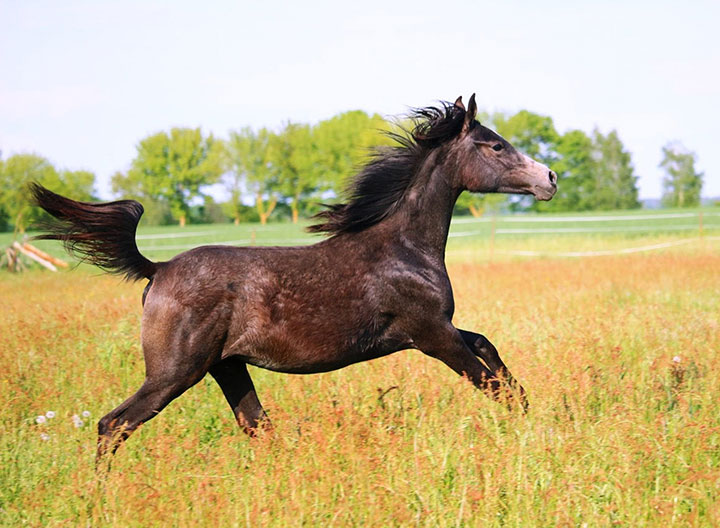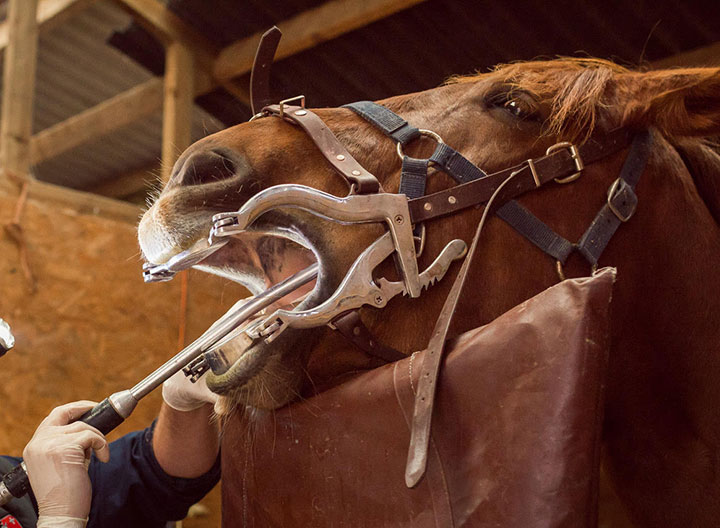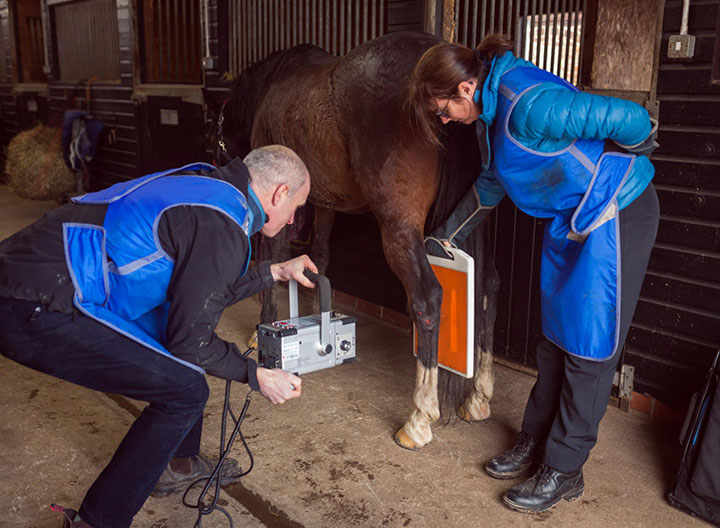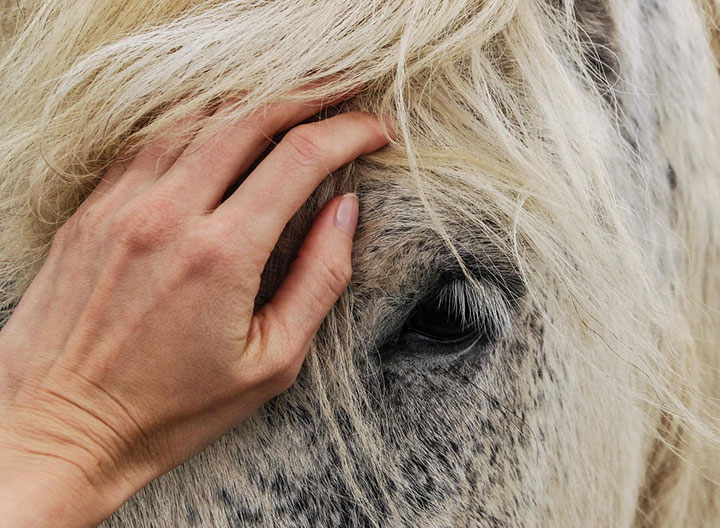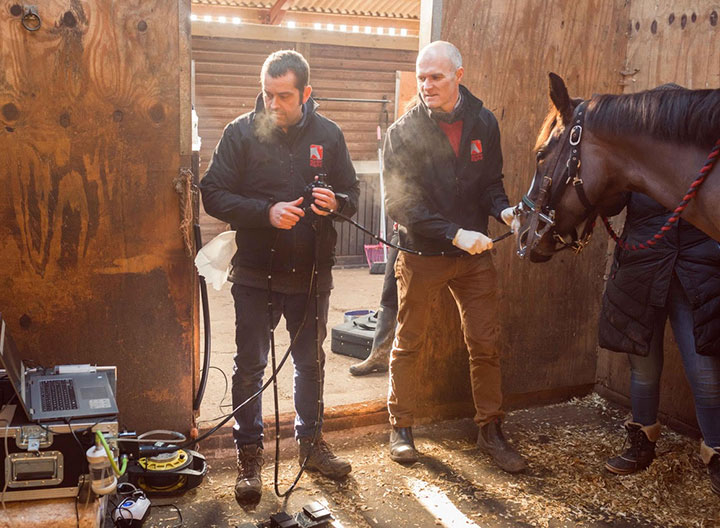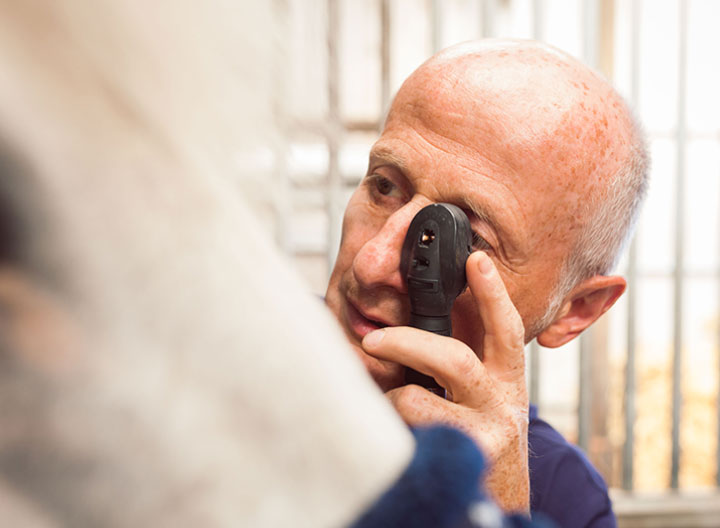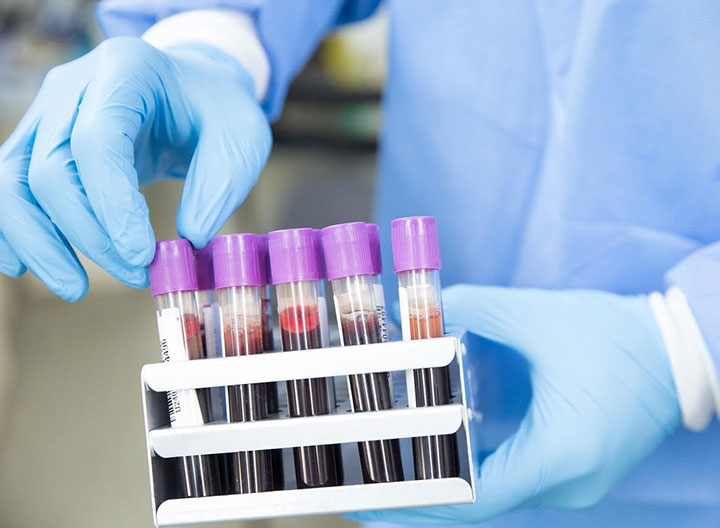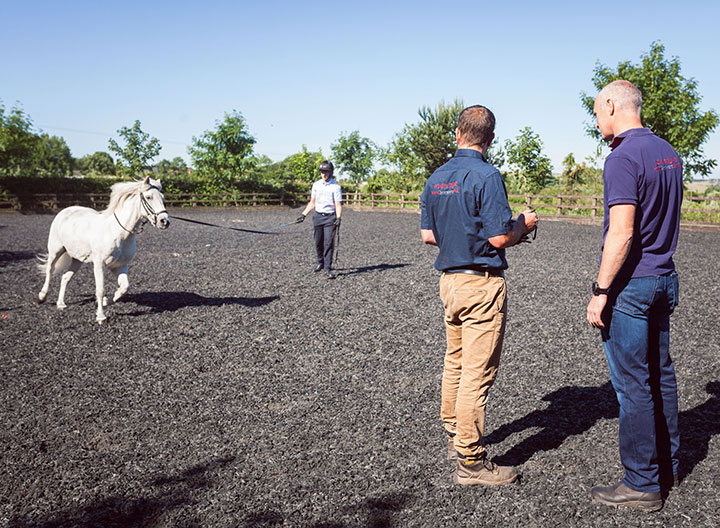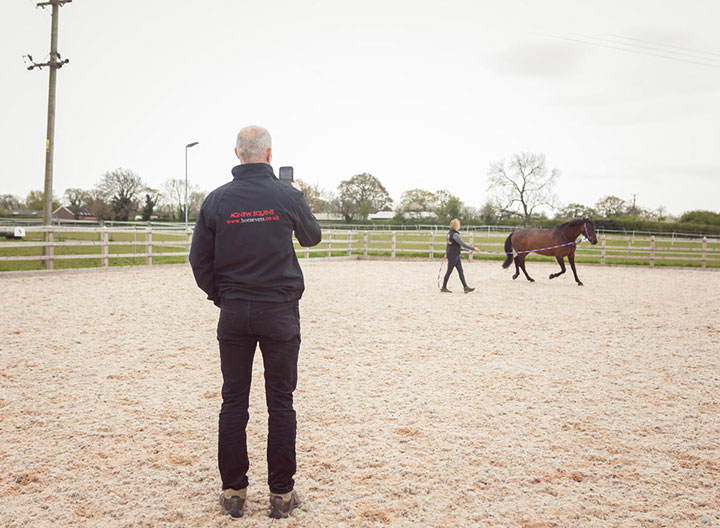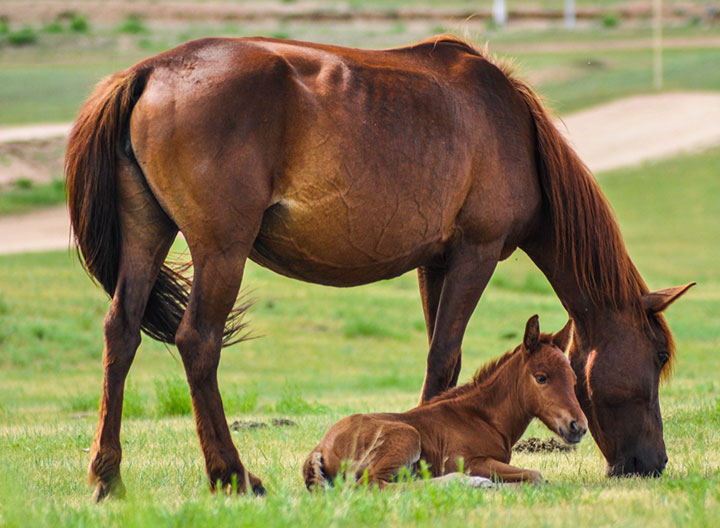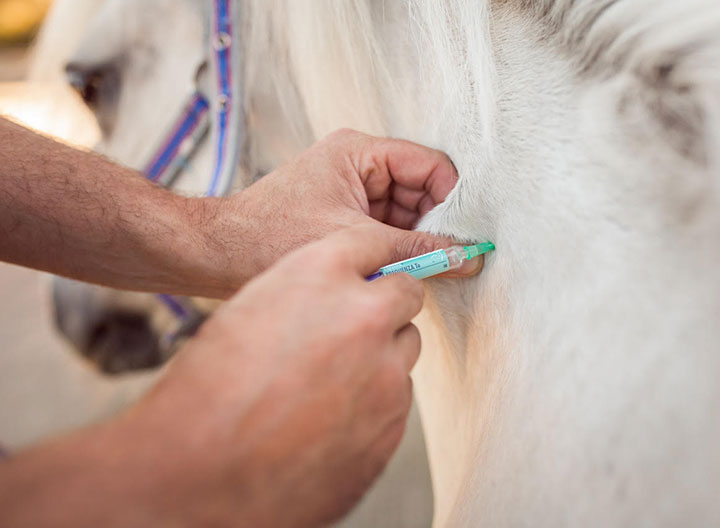Vaccination
Vaccination is one of the pillars of preventative healthcare for your horse - and it has two objectives; first, it is to protect your horse or pony from a particular disease, bearing in mind this may not be a complete absence of the disease, but at the minimum a significant reduction in the severity of the illness. Second, vaccination minimises the spread of a disease throughout the entire horse population, which reduces the impact of an outbreak. The overall goal in the horse population is to achieve ‘herd immunity’ which if reached would protect the whole population effectively and eradicate outbreaks altogether.
Agnew Equine strongly recommend annual vaccination for Equine Flu and Tetanus.
WHAT IS EQUINE FLU?
Equine flu is a highly contagious and debilitating viral respiratory disease. It is caused by an airborne virus which can spread as far as 5km. This means that even if your horse lives on its own he is still at risk of contracting the disease. Those horses that are at greater risk include youngsters up to 5 years old and those that come into contact with lots of different horses, for example at larger yards and/or shows and competitions etc. It can also be transmitted via people, tack, feed and equipment. Unvaccinated horses are likely to show marked signs whereas vaccinated horses should only display mild signs, if any at all. Signs of equine flu infection can be severe and include a harsh, dry cough, high temperature, nasal discharge, loss of appetite and Lethargy.
The recommendations for a combined course are:
- Primary Course: Two injections given 4 – 6 weeks apart (21 - 92 days)
- Third injection: Given 6 months after the 2nd primary injection (150 - 215 days)
- Six-monthly or Annual Boosters: Given within 180 days or 365 days of the proceeding injection
In most horses, protection against illness in the individual will last around a year, however, immunity decreases from 6 months and protection of the herd by reduction of virus shedding will only last up to six months. This is why regular vaccination is essential, and explains the need to vaccinate those individuals who have higher risk on a six monthly basis.
WHAT IS TETANUS?
Tetanus is usually a fatal disease, and easily preventable with a vaccine, so we strongly advise that all horses are vaccinated against tetanus, regardless of age.
Tetanus is a bacterial infection Clostridium tetani which can be found in soil and droppings, where the toxins produced attack the horse’s nervous system. The most common way that bacteria can enter the body is through a contaminated wound or foot abscess. In foals it might enter via the umbilcus. In the correct conditions it can release powerful toxins which can affect the horse’s nervous system. Although all species can be affected, horses are particularly susceptible as a result of the conditions in which they live and their tendency to suffer injuries. In most cases, the disease proves fatal despite attempts at treatment. All horses are at risk of Tetanus.
Early signs of tetanus may be confused with some other diseases such as ‘tying up’. Symptoms might include:
- Stiffness to move
- Elevation of the tail
- ‘Lock-jaw’, the horse may want to eat but be physically unable to open its mouth.
- Third eyelid prolapse – the third eyelid which isn’t normally visible on the inside of the horse’s eye will become prominent especially when the affected horse is stimulated.
- Convulsions
For horses being vaccinated against tetanus only, the recommendations are:
- Primary Course: Two injections given 4 – 6 weeks apart (21 - 92 days)
- Third injection: Given 6 months after the 2nd primary injection (150 - 215 days)
- Annual Boosters: Given within 365 days of the proceeding injection
Foals can begin their own course of vaccinations from 6 months of age (both ‘flu and tetanus). Immunity to tetanus in young foals should be achieved either by the administration of a dose of tetanus antiserum given as soon after birth as possible or vaccinating the mare 1 month before foaling.
FLU AND TETANUS COMBINED
The recommendations for a combined course are:
- Primary Course: Two injections given 4 – 6 weeks apart (21 - 92 days)
- Third injection: Given 6 months after the 2nd primary injection (150 - 215 days)
- Six-monthly or Annual Boosters: Given within 180 days or 365 days of the proceeding injection
- Tetanus vaccinations are included in the booster every other year
VACCINATION DETAILS & PROCESSES
Horses can be vaccinated against these two diseases using combined vaccines. To ensure that your horses are given maximum protection, we only use vaccines which contain the latest strains of influenza virus or those which match closely with the strains likely to be encountered in field situations. The vaccination which we currently use at the practice is ProteqFlu® and ProteqFlu-Te®. These vaccines contain the strains which are currently circulating in the UK, as recommended by the World Organisation for Animal Health (OIE). This means that your horse has received the most up to date protection against equine flu.
Recommendations for vaccinations vary according to the data sheets from the vaccination companies, FEI guidelines (the international governing body of equestrian sports) the British Horseracing Authority Rules (formerly known as the Jockey Club) and stipulations from individual shows, e.g. HOYS.
Our practice recommendations will ensure that all of the above requirements are accounted for.
Horses should be well when they are vaccinated and not have a temperature. They should not be ridden within 24 hours of receiving a vaccination and they should not be attending a show or competition within 7 days of a vaccination. A horse will be protected against both ‘flu and tetanus within 7 days after the 2nd vaccination in the primary course.
If there is a concern for tetanus in that time a tetanus antitoxin injection can be administered which gives immediate protection but only lasts 3-4 weeks.
Because we are stimulating the immune system to create a protective response to a given disease by giving the vaccination, this does carry a risk of side effects to the individual. Common side effects include muscle stiffness or soreness, mild and transient increase in body temperature, and occasionally lumps or even abscesses at the site of injection. In the vast majority of these circumstances, these effects resolve fully within 48hrs. If you have general concerns about vaccinations, or would like to discuss this with your vet - give us a call on 01782 510 502.
Vaccinations are normally given into the muscle on the left hand side of the neck. Occasionally horses can be a bit stiff after a vaccination, in those cases we can give the injection into the gluteal (bottom) muscles or into the pectoral (chest) muscles.
COMPETITION INFORMATION
During high risk periods / outbreaks of flu, a shorter interval between boosters may be advised. FEI rules state that ‘flu vaccinations should be given within 6 months of a competition.
- Always check the vaccination requirements of a show well in advance of travelling there
- Always have your passport with you when the vet comes to vaccinate your horse
Although HOYS stipulate that a third vaccine 150 - 215 days after the 2nd vaccination is not strictly necessary to enter the show, the show vet and the practice both recommend vaccinating in accordance with the practice guidelines to ensure that vaccination requirements are met for other shows.
For more information on the FEI and their vaccination recommendations – please have a look at the link here: https://campus.fei.org/course/info.php?id=82
OTHER DISEASES
Other diseases which horses can be vaccinated against include:
EQUINE HERPES VIRUS
Equine Herpes Virus or EHV is a common virus that is endemic in horse populations worldwide. There are at least 5 types of Herpes virus but we are most interested in EHV-1 and EHV-4.
EHV-1 usually causes a mild respiratory disease, but in pregnant mares it can cause abortion and rarely also has the ability to cause neurological disease. EHV-4 usually causes respiratory disease. Currently there is a licensed vaccine which is used to protect against both EHV-1 and EHV-4 but it is only licensed and effective against respiratory disease and abortion. It is NOT licensed for or proven to work against the neurological form of the disease.
If you would like the EHV vaccine we are happy to provide this to you. The vaccine offers good protection against abortion and respiratory disease but remember minimal protection against the neurological form of the disease.
The protocol for protection against the respiratory form of infection is:
- Two initial vaccines 4 - 6 weeks apart
- Booster injections every 6 months
We usually recommend vaccinating pregnant mares against this disease at 5, 7 and 9 months of gestation.
STRANGLES
Strangles is an infectious disease in horses caused by a bacterium called Streptococcus equi var equi. It can affect horses of all ages and types. Symptoms may include a cough, nasal discharge, swollen and painful lymph nodes, difficulty breathing, a high temperature and reluctance to eat. It is highly contagious and can affect multiple horses on a yard.
A vaccine to control strangles is commercially available called Equilis StrepE. Unlike most vaccinations it is given into the upper lip of the horse.
- Primary course: two injections given 4 weeks apart
- Boosters: Every 3 - 6 months
It is recommended that all horses on the yard have the vaccination and that, in conjunction with other control measures e.g. isolating new horses, it dramatically reduces the chance of a strangles outbreak. During high risk periods/outbreaks of strangles, a 3 month interval between boosters is advised.
EQUINE VIRAL ARTERITIS
Breeding stallions can be vaccinated against this disease. Vets in the UK are keen to vaccinate stallions against EVA because it is actually a respiratory virus primarily that can affect mares, geldings and stallions. The respiratory infection causes 'flu-like symptoms in all horses. If a pregnant mare contracts EVA she will abort and if a stables had several mares in foal it is likely all would abort.
This is a Notifiable disease meaning any diagnosis should notify the Government vets. As a result it is very rarely diagnosed in the UK.
If you have any questions about any of the vaccines that we offer, whether you should vaccinate your horse or pony - or have any concerns about vaccinations in general, please contact us.

